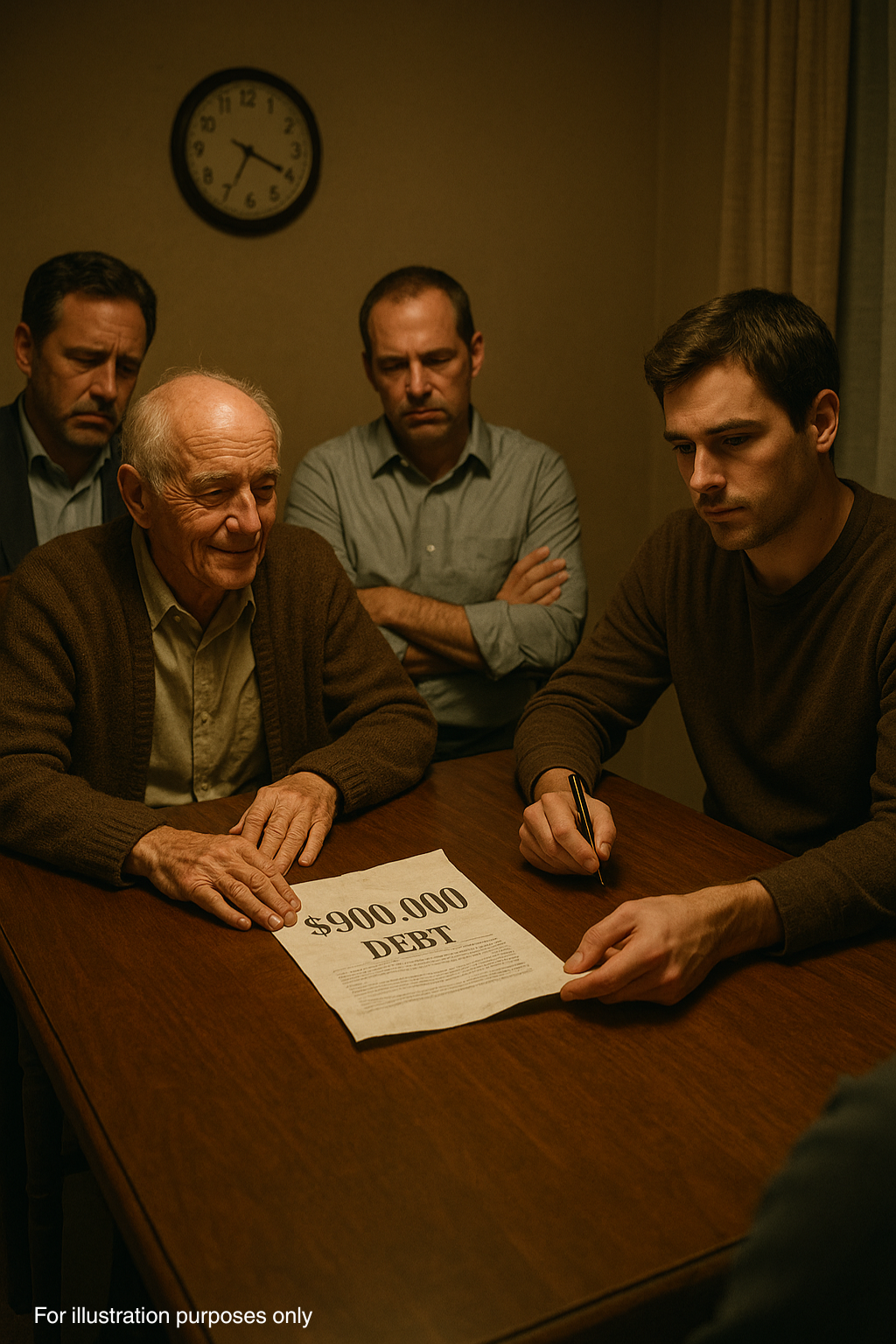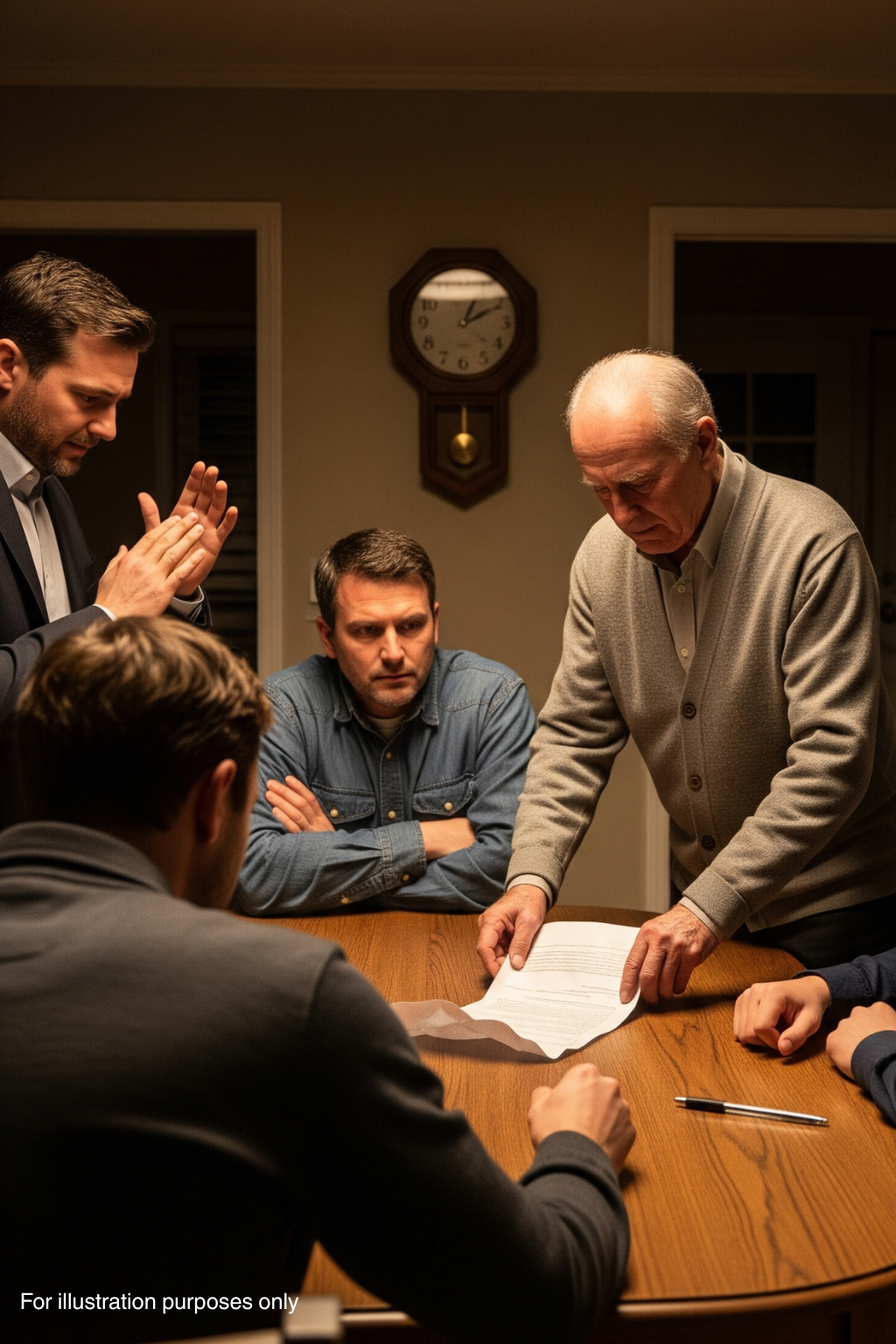I Took My Father’s $900,000 Debt—A Year Later, His Secret Changed Everything
When my father returned from the hospital, his silence unsettled me. His shoulders sagged, his once-proud frame looked smaller, weaker. Without saying a word, he placed a single folded document on the table.
It was a promissory note for $900,000.
The room went cold. My brothers and I exchanged bewildered glances, the ticking clock suddenly deafening.
My eldest brother broke the silence.
“Dad, I can’t. Every cent I earn is tied up in my kids’ college tuition.”

The second quickly added, “I just opened the store. I’m drowning in bills already. There’s no way.”
Both turned toward me—the youngest, newly married, still paying off a mortgage. My wife and I had simple dreams: a little house, stability, maybe one vacation a year.
But then I looked at my father’s face. His eyes were weary, his body frail… and I knew.
“I’ll take it,” I whispered.
My brothers stared at me like I was insane. But my father… he smiled, faintly, almost imperceptibly.
That week, he moved into my home. And my life changed overnight.
I worked myself raw—early mornings, late nights, extra jobs. We cut expenses to the bone. My wife sold her beloved motorcycle, stopped buying new clothes, stretched every meal. Dinner was often little more than beans or bread, but we endured.
And yet, amid the exhaustion, there were moments of grace. I would stumble home, half-dead from work, only to find my father in the courtyard with my children nestled against him, listening to his stories. For the first time in years, I saw him smile—soft, genuine, unguarded.
Those smiles fueled me more than food.
One year later, he summoned me to his room. His hands trembled as he opened a drawer and pulled out a folded sheet. He slid it across the table.
“Read,” he said.
My heart sank—I feared another debt, another burden. But when I unfolded the paper, my breath caught.
It was a will.
He had left me his three-story house in the city center… and a plot of prime commercial land.
I stared, unable to process. My father leaned forward, his eyes glistening.
“All my life, I needed to know: when the storm came, which of my sons would stand by me? Now I know.”
My throat burned with unspoken tears.
Then—footsteps. My brothers stood in the doorway. They had overheard. Their eyes locked on the will, their faces twisted with regret and disbelief.
“Dad,” my eldest rasped, “why him? We’re your sons too.”
My father’s reply was calm, resolute.
“When I needed help, only your younger brother carried the weight. This—” he gestured to the will “—is not about wealth. It is about loyalty.”
Silence fell. My brothers lowered their heads, heavy with shame, and left without another word.
My father then placed his weathered hand on my shoulder.
“You don’t owe a cent,” he whispered. “That debt… I settled it long ago. It was never about the money. It was a test.”

The world tilted. A year of sacrifice, of sleepless nights and empty stomachs… had not been about dollars, but about love.
I broke down in that room, not from relief, but from the sheer weight of what I had learned: family is not proven by words, but by sacrifice.
When news of the will spread, whispers followed. Some praised my father’s wisdom; others called him unfair. But none of it mattered. The true inheritance was not the house, not the land—it was his trust.
Late at night, when I pass the courtyard and see him asleep with my children curled against him, I remember the day that cursed promissory note landed on the table. At the time, it looked like ruin. In truth, it was the greatest gift: a chance to prove my love, to grow in resilience, and to discover the strength of my family.
And though people argue about fairness and fortune, I know the truth. My father tested me. I passed. And that is something no one can ever take away.